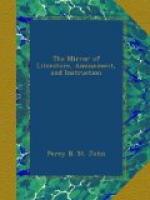* * * * *
AUCTIONS.
Elihu Yale was remarkable for his auctions. The first of these was about the year 1700. He had brought such quantities of goods from India, that, finding no one house large enough to stow them in, he had a public sale of the over-plus; and that was the first auction of the kind in England.
* * * * *
LILLY, THE ASTROLOGER.
While this impudent cheat is ridiculed for his absurdities, let him have credit for as lucky a guess as ever blessed the pages even of “Francis Moore, physician.” In his “Astrologicall Predictions for 1648,” there occurs the following passage, in which we must needs allow that he attained to “something like prophetic strain,” when we call to mind that the great Plague of London occurred in 1665, and the great Fire in the year following:
“In the year 1656 the aphelium of Mars, who is the generall significator of England, will be in Virgo, which is assuredly the ascendant of the English Monarchy, but Aries of the kingdom. When this absis, therefore, of Mars shall appear in Virgo, who shall expect less than a strange catastrophe of human affairs in the commonwealth, monarchy, and kingdom of England? There will then, either in or about these times, or neer that year, or within ten years, more or less, of that time, appear in this kingdom so strange a revolution of fate, so grand a catastrophe, and great mutation unto this monarchy and government, as never yet appeared; of which, as the times now stand, I have no liberty or encouragement to deliver any opinion. Only, it will be ominous to London, unto her merchants at sea, to her traffique at land, to her poor, to her rich, to all sorts of people inhabiting in her or her liberties, BY REASON OF SUNDRY FIRES AND A CONSUMING PLAGUE.”
This is the prediction which, in 1666, led to his being examined by a Committee of the House of Commons; not, as has been supposed, that he might “discover by the stars who were the authors of the Fire of London,” but because the precision with which he was thought to have foretold the event, gave birth to a suspicion that he was already acquainted with them, and privy to the (supposed) machinations which had brought about the catastrophe. Curran says, there are two kind of prophets, those who are really inspired, and those who prophesy events which they intend themselves to bring about. Upon this occasion, poor Lilly had the ill-luck to be deemed one of the latter class.
* * * * *
WHIGS AND TORIES.
Whenever these terms were first introduced, and whatever might be their original meaning, it is certain that in the reign of Charles the Second they carried the political signification which they still retain. Take, as a proof, the following nervous passage from Dryden’s Epilogue to “The Duke of Guise,” 1683:




